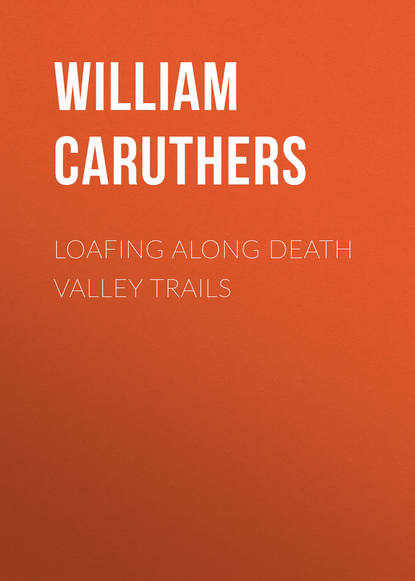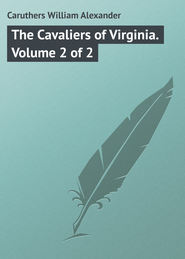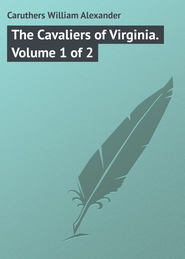По всем вопросам обращайтесь на: info@litportal.ru
(©) 2003-2024.
✖
Loafing Along Death Valley Trails
Настройки чтения
Размер шрифта
Высота строк
Поля
One day when Ballarat travel was heavy, a dapper passenger dropped off the stage, entered the saloon, bought a drink and paid for it with a $20 gold piece, getting $19.50 in change. When he’d gone, Shorty Harris standing by said: “Chris, that money doesn’t sound right.”
Chris examined it. The gold piece had been split, hollowed out and filled with alloy. Chris worried awhile, then brightened when he noticed his place was full of loafers playing solitaire; pulling at soggy pipes; waiting for a “live one.” “Boys,” said Chris, “old Whiskers ain’t getting much play. Let’s go down and see him.”
Whiskers was his competitor down the street.
A few moments later the bat-wing doors of Whiskers’ place flew open and Chris and his bums swarmed in. Chris laid an arm on the bar. “What’ll it be fellows?” Then he turned to the loafers along the walk “Line up, you guys and have a drink.”
They did and when the drinks were downed, Chris laid the phony gold piece on the bar, received his change and with his crowd returned to his bar. An hour later he was still laughing to himself over the trick he’d played on Whiskers when his own sawed-off doors flapped open and Whiskers barged in, followed by his own mob of moochers. Whiskers ordered for the house and laid down the $20. Chris gulped and gave the change.
That coin circulated in every store and saloon in Ballarat for more than a year. Everybody knew it was phony, but accepted it without question and came to regard it with something akin to affection. Then one day a gentleman in spats came along and the $20 gold piece left forever.
Billy Heider, a slim, genial fellow who had been a hat salesman in a smart toggery shop in Los Angeles came not for gold but to escape alimony. His easy smile masked a stubbornness that nothing could conquer. “… she got a smart lawyer and dated the Judge,” Billy said.
He hung his bench-made suit on a peg, slipped into overalls, cut off one sleeve of his tuxedo to cover a canteen, spread the rest on the floor beside his bed to step on in the morning and so – transition. Eventually he began to prospect, kept at it for 20 years; found nothing, but he beat alimony.
Usually mines were “salted” in shaft or tunnel to separate the sucker from his money, but it remained for a Ballarat woman to find a simpler way.
Michael Sherlock, known as Sparkplug, because of continual trouble with that feature of his automobile, gave me her formula: “She owned a claim in Pleasant Canyon that had a showing of gold. She wanted $10,000 for it. A rich auto dealer came along to look at it. He was worth at least $5,000,000. She told him to take his mining engineer and get his own samples and when he got back she’d have a chicken dinner waiting.
“They got the samples, came down, parked the car in front of her house, got their bellies full of chicken and went back to the city. A couple of days later the millionaire was back. Couldn’t get his money into her hands quick enough. Word went out there would be work enough for all comers and we figured on boom times. But he couldn’t find ore to match her samples.”
“What happened?” I asked.
“While he was eating chicken dinner that night, her Indian hired man went out to his auto and switched samples.”
I asked Sparkplug why he didn’t sue her.
“If you had $5,000,000 would you want the whole dam’ state laughing at you?”
Randsburg, which boomed in the early Eighties as a result of gold strikes in the Yellow Aster, the King Solomon, and later the Kelly silver mine, soon became one of the principal eastern gateways to the Panamint and to Death Valley by way of Granite Wells and Wingate Pass.
A curious story of a man haunted by his conscience is that of William Dooley and told to me by Dr. Samuel Slocum, who had come to Randsburg from Arizona after making a fortune in gold.
A howling blizzard had driven everyone from the streets and the campers in Fiddlers’ Gulch into Billy Hevron’s saloon. Dr. Slocum, lost in the blinding snow and stumbling along the street, felt with his hands for walls he couldn’t see, while a barroom noise guided him to the door.
At the bar he saw William Paddock, mining engineer. “Bill, you’re the man I’m looking for. I can’t find anyone who can tell me how to get to Goler Canyon in Panamint Valley. You’ve been there and I want you to draw me a map.”
Paddock, finishing a drink ordered one for Slocum and introduced him to a man at his side: “This is Mr. Dooley,” Paddock said, and the doctor saw a great hulk of a man with black whiskers, small eyes, and an uneasy look. Before a word was spoken Slocum sensed Dooley’s instant dislike of him.
Slocum ordered a round of drinks. Dooley refused and walked to the farther end of the bar.
Paddock followed Dooley after a moment, talked with him and returned to his drink. He said to Slocum: “I’m in a curious situation. I don’t know much about Dooley, but down in Mexico he saved my life. Now it’s my turn to save his. He just killed a man in Arizona and came here to hide out. I’m taking him to Goler Canyon soon as this blizzard is over. He thinks you are a deputy U. S. Marshal and claims that he has seen you before and that you are no doctor.”
“He may have seen me in Arizona at Gold Hill,” Slocum said.
“The best way I can help you,” Paddock continued, “is to sign the road as I go and after a day or two you can follow us.”
On the day following Paddock’s departure Doctor Slocum set out. The next day he came upon a newly-made grave, outlined with stone. On a redwood board used for the marker was carved this inscription:
“Here lies Bill Dooley who died by giving Wm. Paddock the dam’ lie.”
With no reason to shed tears, the Doctor following Paddock’s signs, reached Goler Canyon, made camp and knowing that Paddock intended to occupy a stone cabin farther up the gulch, he started up the trail. He’d gone only a short distance when he saw Paddock approaching, waving his arms in a signal for Slocum to go back. The Doctor stopped.
When Paddock came down he said, “For God’s sake, Doc, get back to your camp. Dooley is behind that big boulder above us with a Winchester trained on you.”
“Why, I thought he was dead…”
“No,” Paddock smiled grimly. “He worked all night digging that grave. Said it would throw you off his trail. I can’t get it out of his head you’re a marshal.”
Slocum had made a gruelling trip to free and open country and he had no intention of being driven out. “I’ll go up and talk to him,” he said. Paddock warned him that it would be useless and might be fatal, but Slocum insisted and they went up the trail, Paddock going in front to shield him.
Dooley was outside the cabin with a rifle in the crook of his arm, his finger on the trigger.
Slocum was unarmed. He calmly assured Dooley he was not an officer; that he had no intention of disclosing Dooley’s whereabouts, “But this is free country and I intend to stay.”
Dooley’s reaction was a noncommittal grunt. However, violence was avoided. When the Doctor returned to his camp, Paddock decided it would be best to accompany him as a measure of safety. Explaining to Dooley that he would remain with the Doctor to inspect a claim, he remained as a body-guard for three days. On the fourth he went up to the stone cabin and discovered Dooley had loaded his wagon with all the camp equipment and supplies, including a green water keg and left for parts unknown.
Just across the range was Hungry Bill’s country. A year or so afterward Doctor Slocum, crossing the mountains into Death Valley, stopped at Hungry Bill’s Six Spring Canyon Ranch and noticed a green cask. Hungry Bill said that he had found the keg floating on the ooze near Badwater. “Somewhere under that ooze,” Doctor Slocum said, “lies Bill Dooley, his team, his wagon, and its load.”
An interesting character of this area was Toppy Johnson, who scouted for Senator George Hearst and later had charge of copper claims belonging to William Randolph Hearst, near Granite Wells.
While there, Toppy employed Aunt Liza, a negro cook. Aunt Liza came from Randsburg with an enormous trunk. She was a good cook, but an awful thief and nearly everything Toppy owned except the furniture disappeared piece by piece. When his razor vanished he looked through the trunk and found the loot. He didn’t want to lose Aunt Liza, so he removed a few of the more needed things, leaving the rest to be recovered by instalments. Thereafter it was a game of losing and retrieving.
As strange a coincidence as I’ve ever heard attended the end of Toppy Johnson. Sent to Mexico when Pancho Villa was overrunning the country, he fled to Mazatlan when Pancho announced he would shoot on sight both native and foreigners who were not in sympathy with his marauding.
All boats were crowded with refugees, both native and alien, but Toppy was permitted to join the hundreds willing to sleep on deck. Toppy unwittingly chose a spot over the saloon where drunken celebrants soon began shooting at the ceiling.
A shot penetrated the flooring of the craft’s deck and Toppy’s abdomen. An American physician sleeping alongside was awakened by Toppy’s groans, attended him, but saw there was no hope. The physician asked his name, the object being to notify the victim’s relatives.
“If my doctor were only here,” Toppy moaned, “he could save me.”
“Who is your doctor?”
“Dr. Samuel Slocum, of Pasadena,” Toppy said, and died.
The physician was Dr. Slocum’s nephew.
Thirty-four miles south of Ballarat at the end of a narrow canyon leading from Wingate Pass road into Death Valley, one comes upon a breath-taking riot of color. Pink hills. Blue hills. Hills of dazzling white, mottled with black and green. Yellow hills. Maroon and jade hills.
A gentleman of fine fancy and fluent tongue passed that way, learned that under the hills was a deposit of epsom salts. Then he went to Hollywood where salts met money. He talked convincingly of nature’s drug store. “Just sink a shovel into the ground and up comes two dollars’ worth of medicine recommended by every doctor in the country. No educating the public. Everybody knows epsom salts.”
There was no flaw in that argument and Hollywood dipped into its pockets. A mono rail was strung from Searles’ Lake over the Slate Range through Wingate Pass and up the slopes to the pink hills. There rose Epsom City. For awhile the balanced cars scooted along that gleaming rail, bearing salts to market – dreams of wealth to Hollywood.
But the world had enough salts, Epsom City failed. Nothing is left to remind one of the incredible folly but a few boards and a pile of bones. The bones are those of wild burros slaughtered by vandals who in a project as inhuman as ever excited lust for money, went through the country and killed the helpless animals, to be sold to manufacturers of chicken and dog food.
A singular character known as Dad Smith, who had come to California with John C. Fremont was one of the earliest settlers at Post Office Springs. Smith had been a scout with Kit Carson in the Apache wars in Arizona and returned to the lower Panamint in 1860, to hunt gold in Butte Valley, where, nearing 90 he dug a tunnel 100 feet in length. Found there delirious, with pneumonia, by Dr. Samuel Slocum, he was removed to the Doctor’s camp where Mrs. Slocum nursed him through his convalescence. When he recovered he decided to give Mrs. Slocum a token of his gratitude.
At the time, Barstow and Daggett were the most convenient stations for prospectors in the southerly area. At Daggett they likkered at Mother Featherlegs’. At Barstow they bought at Judge Gooding’s store or at Aunt Hannah’s, and drank at Sloan and Hart’s saloon. Dad’s money, as was that of others, was left with them for safe keeping. So he walked every mile of a ten days’ round trip to get a box of chocolates for Mrs. Slocum. A little chore like that made no difference to Dad. He encountered a desert rain and arrived at the Slocum cabin drenched. They persuaded him to remain overnight and led him to a tent.







